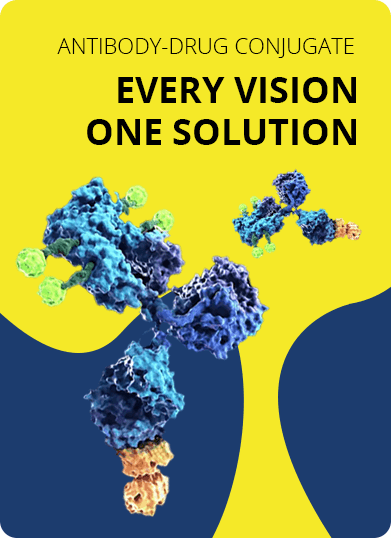- Home
- Applications
- Solid Tumor
- Mesothelin
ADC Development Services Targeting Mesothelin
Antibody-drug conjugates (ADCs) as a promising and potential therapeutic option for cancer treatment have been developed actively currently. A successful antibody-drug conjugate (ADCs) should maintain all the functions of its individual components. Thus, an optimal conjugation needs sufficient knowledge of the reactive groups of linker-payloads, reagent types of different conjugation reaction, and structure and function of antibodies.
Creative Biolabs provides high-quality ADCs design and construction services targeting the mesothelin biomarker with our extensive knowledge in antibody engineering and bio-conjugation. In addition, our hands-on experience enables us to choose the most appropriate approach for modification and conjugation reaction, and a mild purification process.
Introduction of Mesothelin
Mesothelin is a glycosylphosphatidylinositol (GPI)-anchored glycoprotein encoded by the MSLN gene located on chromosome 16p13.3 in humans. Mesothelin was first found due to its interaction with monoclonal antibody K1. It can bind to the cell membrane by a glycophosphatidylinositol linkage and a megakaryocyte-potentiating factor (MPF). To date, the function of mesothelin is limited, only involved in the cell adhesion. Mesothelin exists in normal cells including the mesothelial cells lining the pleura, peritoneum and pericardium and is highly expressed in many cancers such as the pancreatic cancers, ovarian cancers, mesotheliomas, lung adenocarcinoma, cholangiocarcinoma and some other cancers. Therefore, the protein is considered as a tumor marker or as the antigenic target for the treatment of cancers.
Anti-mesothelin ADC in Solid Tumors
Mesothelin is highly expressed on a variety of cancer cells and is considered as a promising target in the ADCs development for cancer therapy. BMS-986148 represents an ADC against mesothelin, which is composed of an anti-mesothelin monoclonal antibody conjugated to the potent alkylating agent duocarmycin (MED2460). Upon internalization, BMS-986148 can release the payload to induce the death of targeted tumor cells. Currently, clinical trials are performed to investigate the safety, tolerability, pharmacokinetics, immunogenicity, antitumor activity and pharmacodynamics of BMS-986148 in patients with solid tumors including the mesothelioma, nonsmall cell lung cancer (NSCLC), ovarian cancer, pancreatic cancer and gastric cancer.
Anti-mesothelin ADC in Pancreatic Cancers
RG7600 (also known as DMOT4039A) is another ADC targeting the mesothelin. It consists of a humanized IgG1 anti-mesothelin mAb h7D9.v3 linked to the potent antimitotic agent, monomethyl auristatin E (MMAE), via a protease-labile valine-citrulline linker. Once the ADC is internalized and releases the MMAE, it can cause the inhibition of cell division and growth to promote tumor cell death. In preclinical studies, RG7600 has specific potent antitumor proliferative activity against mesothelin-expressing cancer cells in xenograft cancer models. Besides, clinical trials results demonstrated that RG7600 has the potential to be better tolerated by human subjects. Thus, this ADC will be a promising option for the treatment of frequently mesothelin-positive ovarian and pancreatic tumors.
Anti-mesothelin ADC in Mesothelin-expressing Tumors
Anetumab ravtansine (also known as BAY 94-9343) is a novel ADC against the mesothelin for the treatment of mesothelin-expressing tumors. It is composed of a human anti-mesothelin antibody linked to the maytansinoid tubulin inhibitor DM4 through a disulfide-containing linker. During the preclinical studies in vitro and in vivo, Anetumab ravtansine showed selective cytotoxicity to mesothelin-expressing cells. It specifically binds to the mesothelin-positive tumors and inhibits tumor growth. In addition, the ADC can induce a bystander effect on neighboring mesothelin-negative tumor cells. It is a potent and effective ADC assessed in the clinical phase II trials currently for the treatment of patients with mesothelin-positive tumors.
What Can We Do for You?
With years of experience and expertise in the field of bio-conjugation, Creative Biolabs provides comprehensive ADCs development services targeting the mesothelin biomarker. With the help of our talented scientists, Creative Biolabs is confident in speeding your drug discovery project and achieving ideal development goals with the most competitive price. For more information, please feel free to contact us.
Our featured custom ADCs services include:
For Research Use Only. NOT FOR CLINICAL USE.

Online Inquiry
Welcome! For price inquiries, please feel free to contact us through the form on the left side. We will get back to you as soon as possible.
